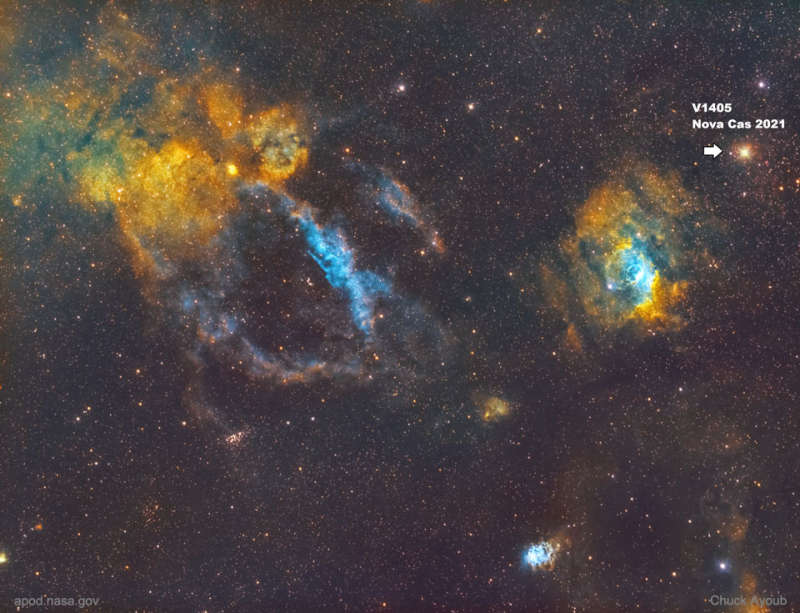Credit & Copyright: Chuck Ayoub
Explanation:
WhatBs that new spot of light in Cassiopeia?
A nova.
Although novas occur frequently throughout the universe, this nova, known as
Nova Cas 2021 or V1405 Cas, became so unusually bright in the
skies of Earth last month that it was visible to the
unaided eye.
Nova Cas 2021 first brightened in mid-March but then, unexpectedly,
became even brighter in mid-May and remained
quite bright for about a week.
The nova then faded back to early-May levels,
but now is slightly brightening again and
remains visible through binoculars.
Identified by the arrow, the nova occurred toward the
constellation
of Cassiopeia,
not far from the
Bubble Nebula.
A nova is typically caused by a
thermonuclear explosion on the surface
of a
white dwarf star that is
accreting matter from a
binary-star
companion -- although details of this outburst are currently unknown.
Novas don't destroy the underlying star, and are
sometimes seen to recur.
The
featured image
was created from 14 hours of imaging from
Detroit,
Michigan,
USA.
Both professional and amateur astronomers will likely continue to monitor
Nova Cas 2021 and
hypothesize about details of its cause.
1999 2000 2001 2002 2003 2004 2005 2006 2007 2008 2009 2010 2011 2012 2013 2014 2015 2016 2017 2018 2019 2020 2021 2022 2023 2024 2025 |
Yanvar' Fevral' Mart Aprel' Mai Iyun' Iyul' Avgust Sentyabr' Oktyabr' Noyabr' Dekabr' |
NASA Web Site Statements, Warnings, and Disclaimers
NASA Official: Jay Norris. Specific rights apply.
A service of: LHEA at NASA / GSFC
& Michigan Tech. U.
|
Publikacii s klyuchevymi slovami:
nova - novye zvezdy
Publikacii so slovami: nova - novye zvezdy | |
Sm. takzhe:
Vse publikacii na tu zhe temu >> | |
